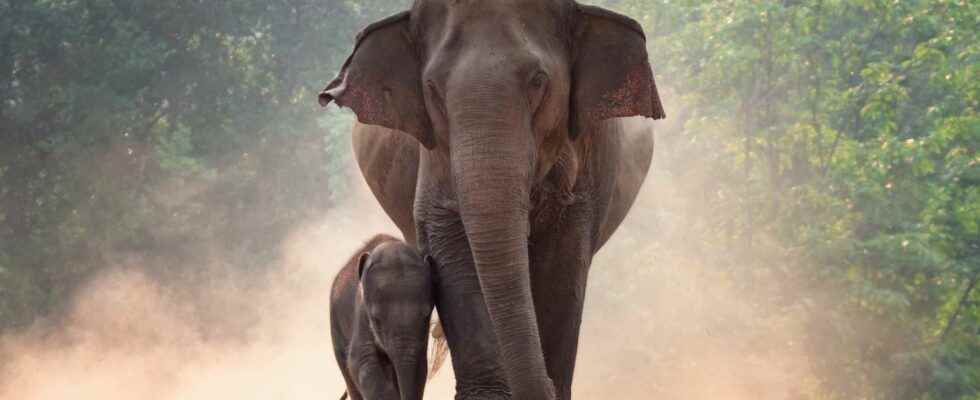You will also be interested
[EN VIDÉO] An Asian elephant solves a problem An Asian elephant at the Washington Zoological Park is the author of insight behavior. He has a problem to solve (unreachable food) and suddenly he finds the solution (a cube to get this food). © Plos One
In the elephant family, there is of course the African elephant. A giant with big ears and formidable tusks. But there is also his cousin, theasian elephant. A smaller coat and with less prominent ears. But above all lighter. When the first can weigh up to 8 tons, the second does not exceed 5 tons.
Another big difference between cousins is their conservation status. Because even if the population of African elephants has decreased significantly over the past 150 years, it remains ten times larger than the population of Asian elephants. This allows the first to be considered only as ” vulnerable “ while the second is estimated ” in danger “. And it is also for this reason that researchers are very interested in them.
Including their lifestyle. Because it is quite natural, we tend to feel a compassion and even a empathy more important for animals that seem to us to experience feelings similar to ours. That’s what the researchers observed: humans bonding with elephants — and in effect, sort of taking them under their wing — because they could notice their behavior in the face of death.
For a long time, in fact, ethologists have noted that elephants experience mourning. Many moving images, showing the giants mourning their dead, have gone around the web. Elephants approaching the lifeless body of one of their relatives, touching it with their trunks or giving it small kicks. Staying by his side, as if to watch over him. African elephants, mostly. Easier to observe in their savannah than the Asian elephants which prefer to hide in the densities of the jungle.
This will move you!! Funeral procession of the weeping elephants carrying dead body of the child elephant. The family just don’t want to leave the baby. pic.twitter.com/KO4s4wCpl0
— Parveen Kaswan (@ParveenKaswan) June 7, 2019
Behaviors that link us to elephants
But this time, it is indeed to Asian elephants that researchers attribute mourning behavior. They were able to observe individuals approaching inanimate bodies, watching them, smelling them or even trying to jostle them. Patting the survivors on the head, as if to comfort them. Especially when it came to small parties too early for the stars, researchers have found adults carrying them with their proboscis for days on end. Even weeks. All as if they were trying to understand what could have happened. In vain…
How not to be moved by this mother elephant filmed near Tumkur, in India, who, with her feet and her trunk, tries to bring her baby’s body back to life? Ears flapping in distress. Insisting for almost 24 hours, despite the efforts of the villagers to scare her away and return to life. Until her companions finally come to comfort her.
The heartbreaking moment a mother elephant tries to revive her dead calf. The grieving mother was seen trying to move the calf for over 24 hours in the village of Tumkur, India. Further proof of this extraordinary species’ intelligence and understanding: https://t.co/7CXUJ9h3Wc
— Save The Asian Elephants (@stae_elephants) October 3, 2018
In September 2018, a video showing an Asian elephant trying to resuscitate its dead calf for several hours, in defiance of the threat and until being consoled by its companions. © DailyMail, YouTube
Perhaps the most astonishing thing is the way in which the ethologists carried out their work. By digging on Youtube ! They thus unearthed several dozen videos showing behaviors associated with mourning in wild Asian elephants as well as in captive or even semi-captive Asian elephants – those who help in the timber industry or who work in tourist parks.
Zoo staff confirm this. When an elephant dies, they are used to seeing the other members of the herd surround it and put their trunks near its mouth. As if to say goodbye to him. One last time. As further proof of thesocial intelligenceof these giants of the land. One more proof that the Asian elephant… is not so stupid! A great way also to provoke a strong emotional attachment with these animals in danger. Even if researchers still have the heavy task of proving that these reactions really reflect mourning in the human sense of the term…
Special offer: for Father’s Day, offer the best of Science!
Your father is a great science enthusiast and unusual discoveries? And if you offer him a superb scientific exploration in paper format? Benefit from -20% on the Mag Futura (special offer: €15 instead of 19 €): 220 pages to explore 4 scientific issues that will shape our future!
Mag Futura is:
- 4 major scientific questions for 2022, from the Earth to the Moon
- 220 pages, 60 experts: no fake news, just science
- Home delivery with electronic gift card
- An independent scientific media
Interested in what you just read?
